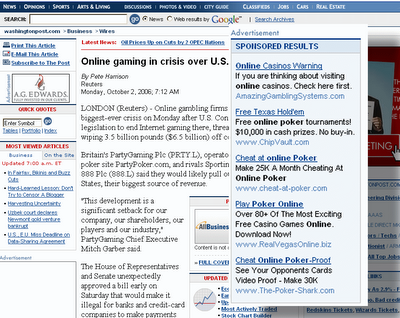 Another great ad placement from Google presented itself as I was reading the news today. What I came across was one more example of the troubles of dealing with AdSense, though this is a totally different issue this time. One of the many challenges with the current ad market is the lack of control publishers and advertisers are provided, even as it relates to their core businesses or brands.
Another great ad placement from Google presented itself as I was reading the news today. What I came across was one more example of the troubles of dealing with AdSense, though this is a totally different issue this time. One of the many challenges with the current ad market is the lack of control publishers and advertisers are provided, even as it relates to their core businesses or brands.The past few examples of poor contextual placement I have posted really were a real life demonstration of how the current online ad market can have a really negative impact to advertisers and what they are trying so hard to portray to their consumers. Many of these ad placements many of the marketers are not even aware of. They were examples of diet advertisers showing-up on articles about anorexia; rocket manufacturers showing up on a report about bombing in Lebanon, and the best was an ad for the new Hummer H2 showing up on a site about global warming and the effects of large vehicles on the loss of the Ozone layer.
This recent advertisement example is actually less of a demonstration of the problem for the advertiser, but more for the publisher and the publisher brand. .
 So, I was reading this article on The Washington Post (my favorite online newspaper) about how the government is finally passing laws against online poker and gambling. There were a few articles, but this one spoke about how players could be sent to jail for breaking the new federal laws against online gambling. There is recent legislation that is waiting for the President to sign just this week.
So, I was reading this article on The Washington Post (my favorite online newspaper) about how the government is finally passing laws against online poker and gambling. There were a few articles, but this one spoke about how players could be sent to jail for breaking the new federal laws against online gambling. There is recent legislation that is waiting for the President to sign just this week.So, the actual story was pretty tame, as it was a syndicated Reuters story, but it spoke about some of the problems online poker sites are facing and how consumers will be next in the crackdown. The story went on to talk about how the US Department of Justice is really set to go after all levels and layers of this business. The overall message was that no one is safe from being prosecuted no matter how small of a gambler you are.
Reading along really interested in the story and some of the great examples and quotes. I arrive at the end of the article feeling like I learned something. I continue to scroll down, and of course there are ads from Google AdSense presented at the bottom of the page. The Washington Post sites, and many other larger branded websites, are active in the Google AdSense program (note: Washington Post was one of the first to work with Google years ago as a search partner).
But the real problem presents itself right away in the text ads that are in that famous AdSense box (footed by the now famous tagline… Ads By Goooooogle.) The ads are for what you would expect… Gambling sites, gambling services, even a bookie site showed up. Not only that, but every time I refresh the page the ads get progressively worse. Every ad I see below this column is about how to become a great online gambler or how to play poker online. Talk about poor placement for the advertiser.

I saw an ad for Cheat-at-Poker.com, that told you how to cheat the online poker systems to make some real money. Directly from the ad on the Washington Post: 'Make 25K A Month Cheating At Online Poker at www.cheat-at-poker.com'. I also saw some ads about transferring money off shore. I saw an ad about different ways to trick the online sites to make an income. Many of the ads were one step away from an offshore gambling site or actually took money for gambling.
I was actually amazed that some of these advertisers showed-up on a high-end site like the Washington Post. Below is a screenshot from the actual article with some of the Google ads that were on the page.
Some of the ads that were most prevalent were about how to use online casinos or make money online. While surfing in this story. I also found ads for betting off shore, Party Poker.net, and RealVegasOnline.biz. This is sort of like the warning labels on cigarettes, as the article spoke about how the online gaming players could be in for a world of hurt soon, as the DOJ starts cracking down, and the dirty off-shore guys were happy to be there for the gambler.
But the bigger story here is not the contextual nature of the ads. I am sure Party Poker would rather their ads don't show-up next to an article that talks about how illegal this whole industry is, but I have seen some of the sites PartyPoker.net shows-up on, and they are not too picky.
The real story in this case is about control. I am sure the Washington Post would not want these ads to show-up on their site. They did not have the control over the article, as it was a syndicated Reuters story, but they should have control over the types of businesses they are marketing to their customers.
I am sure the Washington Post has set rules with Google on what types of ads are acceptable, but Google just does not do a good job of filtering out these ads. The real issue is the Washington Post, which is very concerned about their brand and image, is leaving the control of what ads are presented to their users, to Google. Google is really just concerned with their bottom-line. It is a conflict, and the newspapers need to take control because it is not getting any better.
 I also think Newspapers even have a higher standard of ethics and having even an ad that suggests something illegal is probably not what they are looking for. The real problem here is not the Washington Post team. They have a newspaper, and it is a powerful brand. The real estate on the site is worth a ton of money. They also have tons of stories about everything that is important today.
I also think Newspapers even have a higher standard of ethics and having even an ad that suggests something illegal is probably not what they are looking for. The real problem here is not the Washington Post team. They have a newspaper, and it is a powerful brand. The real estate on the site is worth a ton of money. They also have tons of stories about everything that is important today.
I started looking around the site and found ads for off-shore pharmacies that sell drugs like Vicodin and Codeine. There were ads for sex toys on specific articles. There were even ads for x. I am not saying the Post does not want these ads, I just wonder if they even know they are on the site?
The real issue is Google is the elephant in the room, and we need to continue to challenge them and educate the market on the many alternatives to this elephant. It will increase the top-line for the publishers, ensure they are protecting their brand, and best of all, it will maximize the revenue from the publisher website. Just because elephants are okay with peanuts, why should everyone else?